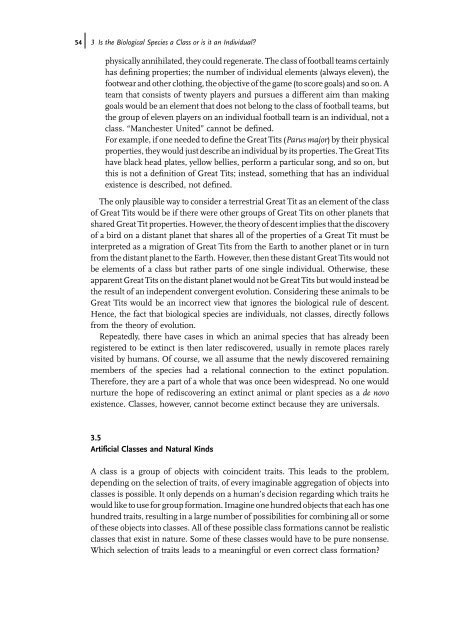Principios de Taxonomia
Create successful ePaper yourself
Turn your PDF publications into a flip-book with our unique Google optimized e-Paper software.
54j 3 Is the Biological Species a Class or is it an Individual?<br />
physically annihilated, they could regenerate. The class of football teams certainly<br />
has <strong>de</strong>fining properties; the number of individual elements (always eleven), the<br />
footwear and other clothing, the objective of the game (to score goals) and so on. A<br />
team that consists of twenty players and pursues a different aim than making<br />
goals would be an element that does not belong to the class of football teams, but<br />
the group of eleven players on an individual football team is an individual, not a<br />
class. Manchester United cannot be <strong>de</strong>fined.<br />
For example, if one nee<strong>de</strong>d to <strong>de</strong>fine the Great Tits (Parus major) by their physical<br />
properties, they would just <strong>de</strong>scribe an individual by its properties. The Great Tits<br />
have black head plates, yellow bellies, perform a particular song, and so on, but<br />
this is not a <strong>de</strong>finition of Great Tits; instead, something that has an individual<br />
existence is <strong>de</strong>scribed, not <strong>de</strong>fined.<br />
The only plausible way to consi<strong>de</strong>r a terrestrial Great Tit as an element of the class<br />
of Great Tits would be if there were other groups of Great Tits on other planets that<br />
shared Great Tit properties. However, the theory of <strong>de</strong>scent implies that the discovery<br />
of a bird on a distant planet that shares all of the properties of a Great Tit must be<br />
interpreted as a migration of Great Tits from the Earth to another planet or in turn<br />
from the distant planet to the Earth. However, then these distant Great Tits would not<br />
be elements of a class but rather parts of one single individual. Otherwise, these<br />
apparent Great Tits on the distant planet would not be Great Tits but would instead be<br />
the result of an in<strong>de</strong>pen<strong>de</strong>nt convergent evolution. Consi<strong>de</strong>ring these animals to be<br />
Great Tits would be an incorrect view that ignores the biological rule of <strong>de</strong>scent.<br />
Hence, the fact that biological species are individuals, not classes, directly follows<br />
from the theory of evolution.<br />
Repeatedly, there have cases in which an animal species that has already been<br />
registered to be extinct is then later rediscovered, usually in remote places rarely<br />
visited by humans. Of course, we all assume that the newly discovered remaining<br />
members of the species had a relational connection to the extinct population.<br />
Therefore, they are a part of a whole that was once been wi<strong>de</strong>spread. No one would<br />
nurture the hope of rediscovering an extinct animal or plant species as a <strong>de</strong> novo<br />
existence. Classes, however, cannot become extinct because they are universals.<br />
3.5<br />
Artificial Classes and Natural Kinds<br />
A class is a group of objects with coinci<strong>de</strong>nt traits. This leads to the problem,<br />
<strong>de</strong>pending on the selection of traits, of every imaginable aggregation of objects into<br />
classes is possible. It only <strong>de</strong>pends on a human s <strong>de</strong>cision regarding which traits he<br />
would like to use for group formation. Imagine one hundred objects that each has one<br />
hundred traits, resulting in a large number of possibilities for combining all or some<br />
of these objects into classes. All of these possible class formations cannot be realistic<br />
classes that exist in nature. Some of these classes would have to be pure nonsense.<br />
Which selection of traits leads to a meaningful or even correct class formation?



